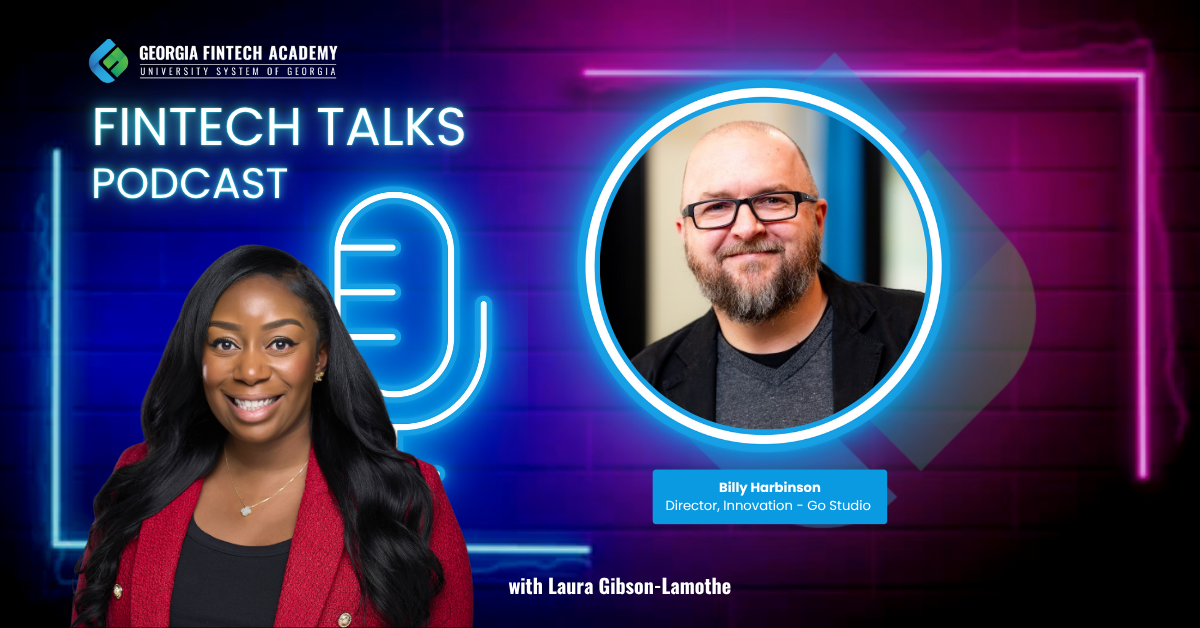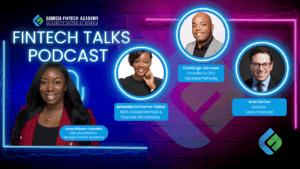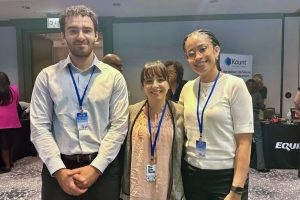Demystifying AI in Fintech: A Q&A with Billy Harbinson of Go Studio
-
by
Laura Gibson-Lamothe
- No Comments on Demystifying AI in Fintech: A Q&A with Billy Harbinson of Go Studio
🔍 Demystifying AI in Fintech: A Q&A with Billy Harbinson of Go Studio
In this episode of Fintech Talks, Georgia Fintech Academy’s Executive Director, Laura Gibson-Lamothe, sat down with Billy Harbinson, Director of Innovation at Go Studio (InComm Payments), for a candid conversation on the evolution of AI in fintech and beyond. From agentic AI to large action models, the conversation covered how AI is transforming the workplace, what students need to know, and why curiosity is still the most powerful learning tool.
Below is a condensed Q&A-style summary of the episode.
💬 Q: What exactly is Agentic AI, and how is it different from the AI we’re used to?
Billy: Agentic AI is the next step beyond chat-based tools. Think of it as preloading a chatbot with context, prompts, and specific goals, so it acts more like a digital assistant than just a conversation tool. Instead of telling ChatGPT what to do each time, you set up an “agent” to handle tasks automatically based on what it already knows about your goals and preferences.
💬 Q: How are Agentic AI tools being used today in real life?
Billy: A simple use case? Automating repetitive research. For example, I’ve built an agent to answer the same 18 research questions over and over—without having to retype them. The goal isn’t to replace human creativity but to eliminate the repetitive work that gets in the way of it.
Laura: I’ve used agentic AI to power our fintech newsletter through RSS feeds. It now gathers relevant news, adds local context, and saves me hours of manual work.
💬 Q: We also hear a lot about Large Language Models (LLMs). How do they fit into the picture?
Billy: LLMs are the engine under the hood. They’re trained to understand and generate language, but they don’t knowthings — they just generate statistically likely responses. Agentic AI wraps additional instruction and context around those LLMs to make them act more intentionally.
💬 Q: And what about Large Action Models (LAMs)? That’s a newer one.
Billy: LAMs are about moving from insight to action. Instead of giving step-by-step instructions, you say, “Plan lunch for my team,” and it knows who’s attending, their preferences, and even what’s on sale nearby. It acts on your behalf based on context — without needing all the setup.
Laura: That sounds like the AI version of having a great executive assistant.
Billy: Exactly. And we’re not fully there yet — but that’s the direction things are heading.
💬 Q: What does all this mean for fintech and financial services?
Billy: Every company is now a tech company — whether they admit it or not. Financial institutions especially need to think about how AI can impact everything from operations to customer expectations. In our work at Go Studio, we look 10 years ahead to help companies prepare for that future.
💬 Q: Some people are worried that AI will replace jobs. How do you see it impacting the workforce?
Billy: AI will change the nature of entry-level work, yes. But we still need human oversight. AI helps with the first 10–20% of a task — the setup. You still need human judgment, creativity, and domain knowledge to finish it. If you’re coming into the workforce, show how you’ve used AI to enhance your work, not replace your thinking.
💬 Q: What advice do you have for students or early-career professionals who want to build AI fluency?
Billy: Start with curiosity. Let it guide your learning. You don’t need a degree or paid course to get started. Free YouTube tutorials, Coursera, or just playing with tools like ChatGPT can go a long way. Also — learn prompt engineering. It’s not code, but it is a language, and learning how to speak it well makes a huge difference.
💬 Q: What excites you most about AI right now?
Billy: The unknown. There are thousands of unanswered questions about AI’s role in culture, ethics, business, and education. We’re all part of shaping that.
✨ Final Thoughts
Laura: Whether you’re a fintech professional or just getting started, this episode is a reminder that AI is worth exploring. The more you engage with it, the more opportunities you unlock.
Stay curious. Stay informed. And stay tuned for more conversations on how fintech and the future of work continue to evolve.
📌 Want more?
Billy and the Go Studio team are hosting “AI 10 Years into the Future” from 1 – 3 pm EST on September 10, 2025. The hybrid event will feature a panel of emerging tech experts discussing how AI will impact businesses and industries over the next decade. Register now to attend in person at The Hatchery, Emory University’s innovation center, or online via livestream: https://www.eventbrite.com/e/ai-10-years-into-the-future-hybrid-event-tickets-1411149268449
- Learn more about Go Studio https://gostudio.io
- Subscribe to the Georgia Fintech Academy newsletter https://www.georgiafintechacademy.org/newsletter
- Catch the full episode on YouTube and wherever you listen to podcasts
Portions of this Q&A summary were generated with the help of AI to support transcription analysis, summarization, and formatting. All content was reviewed and edited by the Georgia Fintech Academy team for accuracy and clarity.




